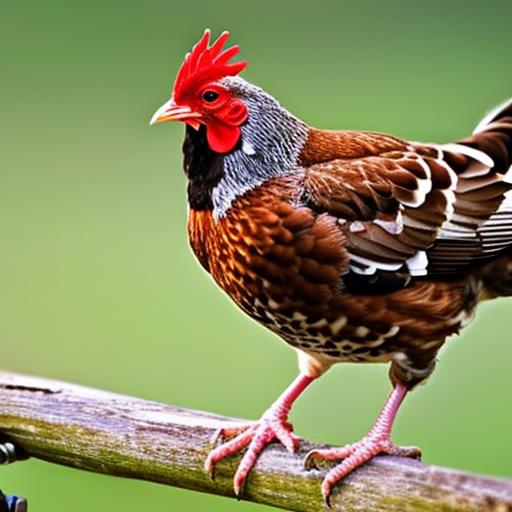Keeping chickens as a hobby or for egg production has become increasingly popular in recent years. More and more people are realizing the benefits of having their own flock of chickens in their backyard. Not only do chickens provide fresh eggs, but they can also be kept as pets, used for meat, or even for pest control. In this article, we will explore the reasons for keeping chickens, the benefits they provide, how to get started, choosing the right breed, building a chicken coop, maintaining it, feeding and caring for chickens, and common challenges that may arise.
Key Takeaways
- Keeping chickens can provide fresh eggs and meat for your family.
- Chickens can also help control pests and fertilize your garden.
- Starting with a small flock and researching breeds can help ensure success.
- Building a secure and comfortable coop is essential for the health of your chickens.
- Regular cleaning and maintenance of the coop and providing proper nutrition are key to keeping chickens healthy.
Reasons for Keeping Chickens
There are several reasons why people choose to keep chickens. One of the main reasons is for fresh eggs. Having your own flock of chickens means you have a constant supply of fresh eggs right in your backyard. You don’t have to rely on store-bought eggs that may have been sitting on the shelves for weeks. Fresh eggs are not only tastier but also more nutritious.
Another reason people keep chickens is as pets. Chickens can be surprisingly friendly and sociable animals. They can be trained to come when called and even enjoy being held and petted. Many people find great joy in spending time with their chickens and watching them roam around the yard.
Some people keep chickens for meat production. Raising your own chickens for meat ensures that you know exactly where your food comes from and how it was raised. It also allows you to have control over the quality of the meat and the conditions in which the animals were raised.
Lastly, chickens can be used for pest control. They love to eat insects and can help keep your garden free from pests like slugs and snails. They also eat kitchen scraps, reducing food waste and providing a sustainable way to dispose of leftovers.
Benefits of Keeping Chickens
Keeping chickens has numerous benefits beyond just fresh eggs or pest control. One of the main benefits is that chickens produce natural fertilizer. Their droppings are rich in nitrogen, phosphorus, and potassium, which are essential nutrients for plants. By using chicken manure as fertilizer, you can improve the health and productivity of your garden without relying on synthetic chemicals.
Keeping chickens also promotes a healthier lifestyle. Taking care of chickens requires physical activity, such as feeding them, cleaning their coop, and letting them out to roam. This can be a great way to get some exercise and fresh air. Additionally, studies have shown that spending time with animals can reduce stress and improve mental well-being.
From an environmental perspective, keeping chickens can help reduce your carbon footprint. By producing your own eggs or meat, you are reducing the demand for factory-farmed products that contribute to deforestation, water pollution, and greenhouse gas emissions. Additionally, supporting local food systems by keeping chickens helps reduce the need for long-distance transportation of food, further reducing carbon emissions.
Getting Started with Keeping Chickens
Before getting started with keeping chickens, there are a few basic requirements to consider. First and foremost, you will need enough space to accommodate your flock. Chickens need room to roam and exercise, so it’s important to provide them with a suitable outdoor area. The size of the space will depend on the number of chickens you plan to keep.
Next, you will need a shelter or chicken coop for your chickens to sleep and lay eggs in. The coop should be secure and protected from predators such as raccoons or foxes. It should also provide adequate ventilation to prevent the buildup of moisture and ammonia from chicken droppings.
In some areas, there may be legal considerations and permits required for keeping chickens. It’s important to check with your local authorities to ensure that you are complying with any regulations or restrictions.
Choosing the Right Chicken Breed
When it comes to choosing the right chicken breed, there are several factors to consider. One of the main considerations is the breed’s egg-laying ability. If your main goal is to have a constant supply of fresh eggs, you will want to choose a breed that is known for its high egg production.
Another factor to consider is the temperament of the breed. Some breeds are more docile and friendly, while others can be more aggressive or flighty. If you have children or plan to interact with your chickens frequently, it’s important to choose a breed that is known for being calm and friendly.
Size is also an important consideration. Some breeds are larger and require more space, while others are smaller and can be kept in smaller coops or even in urban environments.
Building a Chicken Coop

Building a chicken coop is an essential part of keeping chickens. The coop provides shelter and protection for your chickens, as well as a place for them to lay eggs. When building a chicken coop, there are several basic requirements to consider.
First, the coop should be large enough to accommodate your flock comfortably. Each chicken should have at least 4 square feet of space inside the coop and 10 square feet of outdoor space. This will ensure that they have enough room to move around and exercise.
Ventilation is also important to prevent the buildup of moisture and ammonia from chicken droppings. The coop should have windows or vents that can be opened and closed as needed to allow for proper airflow.
Security is another important consideration. The coop should be predator-proof, with sturdy walls and a secure door. It’s also a good idea to bury wire mesh around the perimeter of the coop to prevent predators from digging under.
Chicken Coop Designs and Features
There are many different designs and features that can be incorporated into a chicken coop. One important feature is nesting boxes, where chickens can lay their eggs. Each nesting box should be about 12 inches square and filled with clean straw or wood shavings.
Roosting bars are another important feature. Chickens like to perch at night, so it’s important to provide them with a comfortable place to roost. The bars should be about 2 inches in diameter and placed at a height of about 2 feet off the ground.
Automatic feeders and waterers can also be a convenient addition to a chicken coop. These devices can help ensure that your chickens have a constant supply of food and water, even when you are not able to be there to feed them.
Maintaining a Chicken Coop
Maintaining a chicken coop is essential for the health and well-being of your chickens. Regular cleaning is important to prevent the buildup of droppings, which can attract pests and lead to disease. The coop should be cleaned at least once a week, with droppings removed and fresh bedding added.
Pest control is another important aspect of maintaining a chicken coop. Common pests that can affect chickens include mites, lice, and rodents. Regular inspections and treatments can help prevent infestations and keep your chickens healthy.
Collecting eggs regularly is also important to prevent them from becoming dirty or broken. Eggs should be collected at least once a day and stored in a cool place until they are ready to be used.
Feeding and Caring for Chickens
Feeding chickens a balanced diet is essential for their health and productivity. There are several different types of feed available for chickens, including pellets, crumbles, and mash. These feeds are formulated to provide the necessary nutrients for chickens at different stages of life.
In addition to commercial feed, chickens can also be fed kitchen scraps and garden waste. However, it’s important to avoid feeding them anything that is toxic or harmful, such as onions, garlic, or chocolate.
Fresh water should always be available for chickens. They need access to clean water at all times to stay hydrated and healthy. It’s important to check the water supply regularly and clean and refill it as needed.
Common Challenges and Solutions in Keeping Chickens
Keeping chickens can come with its fair share of challenges. One common challenge is predators. Chickens are vulnerable to predators such as raccoons, foxes, and hawks. To protect your flock, it’s important to secure the coop and run with sturdy fencing and wire mesh. You can also use motion-activated lights or alarms to deter predators.
Disease is another common challenge that chicken owners may face. Chickens can be susceptible to various diseases, such as respiratory infections or parasites. Regular health checks and vaccinations can help prevent the spread of disease. It’s also important to practice good biosecurity measures, such as keeping the coop clean and quarantining new birds before introducing them to the flock.
Egg-laying issues can also arise. Some chickens may stop laying eggs or lay fewer eggs during certain times of the year or as they age. Providing a balanced diet, ensuring they have enough light, and providing a comfortable nesting area can help encourage egg production.
Keeping chickens can be a rewarding and fulfilling hobby or a practical way to have a sustainable food source in your own backyard. The benefits of keeping chickens are numerous, from fresh eggs and natural fertilizer to reducing food waste and promoting a healthier lifestyle. Getting started with keeping chickens requires some basic requirements, such as space, shelter, and food. Choosing the right breed, building a chicken coop, maintaining it, feeding and caring for chickens, and addressing common challenges are all important aspects of successful chicken keeping. So why not consider starting your own backyard flock? You’ll be rewarded with fresh eggs, companionship, and the satisfaction of knowing exactly where your food comes from.
If you’re an American who is considering keeping chickens, you’ll definitely want to check out this informative article on chicken coop interior ideas. It provides valuable insights and inspiration for creating a comfortable and functional living space for your feathered friends. From nesting boxes to roosting bars, this article covers it all. Whether you’re a beginner or an experienced chicken keeper, you’ll find plenty of useful tips and tricks to enhance your coop’s interior. So why wait? Click here to explore the article: https://poultrywizard.com/keeping-chickens/chicken-coop-interior-ideas/.
FAQs
What is the trend of keeping chickens among Americans?
According to recent studies, keeping chickens has become a popular trend among Americans, especially in urban and suburban areas.
Why are Americans keeping chickens?
There are several reasons why Americans are keeping chickens, including as a source of fresh eggs, as a hobby, for educational purposes, and as a way to teach children about responsibility and sustainability.
What are the benefits of keeping chickens?
Keeping chickens can provide several benefits, including a source of fresh eggs, natural pest control, fertilizer for gardens, and a fun and educational hobby.
What are the basic requirements for keeping chickens?
To keep chickens, you will need a coop or shelter, a secure outdoor area for them to roam, food and water, and basic supplies such as bedding and nesting boxes.
Are there any laws or regulations regarding keeping chickens?
Laws and regulations regarding keeping chickens vary by state and local jurisdiction. It is important to research and comply with any applicable laws and regulations before keeping chickens.
What are some common breeds of chickens kept by Americans?
Some common breeds of chickens kept by Americans include Rhode Island Reds, Plymouth Rocks, Leghorns, and Ameraucanas.
Meet Walter, the feathered-friend fanatic of Florida! Nestled in the sunshine state, Walter struts through life with his feathered companions, clucking his way to happiness. With a coop that’s fancier than a five-star hotel, he’s the Don Juan of the chicken world. When he’s not teaching his hens to do the cha-cha, you’ll find him in a heated debate with his prized rooster, Sir Clucks-a-Lot. Walter’s poultry passion is no yolk; he’s the sunny-side-up guy you never knew you needed in your flock of friends!







